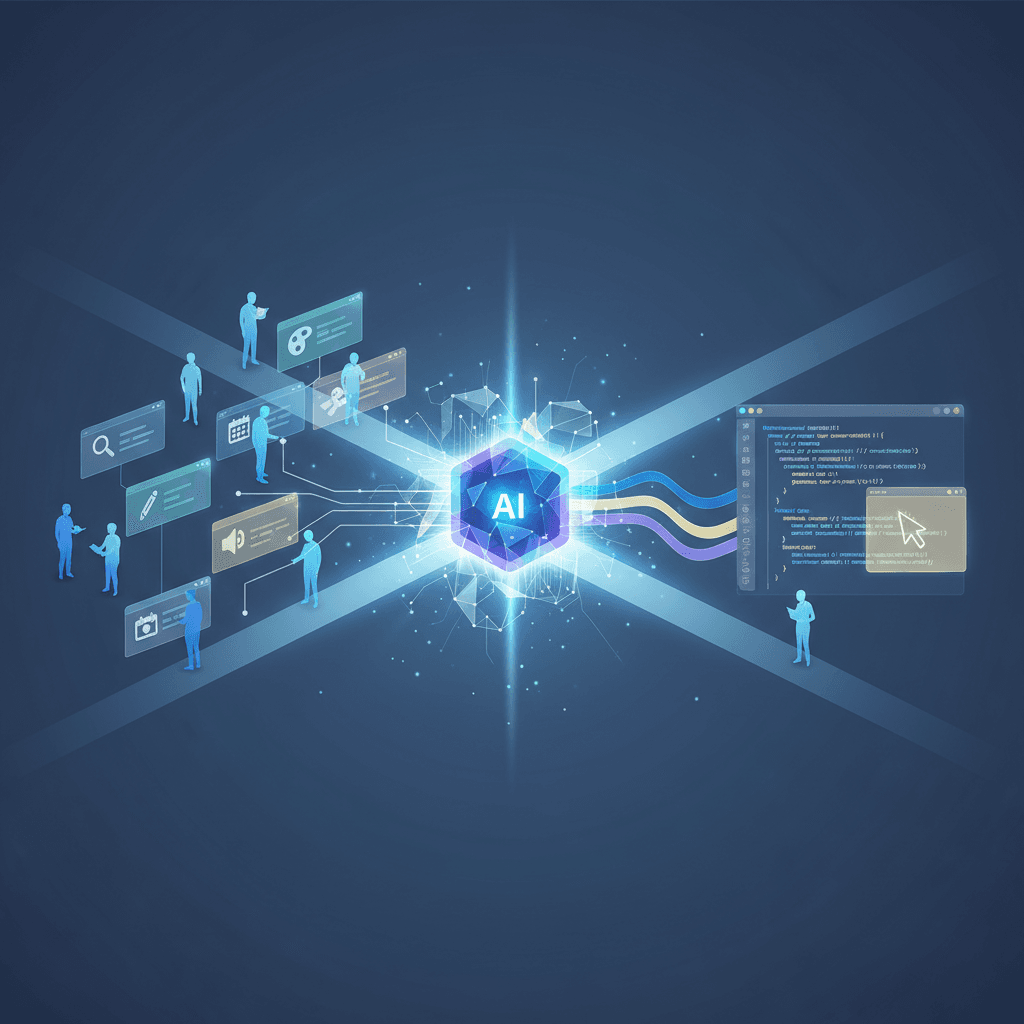OpenAI Democratizes AI, Acquires Alex Team to Dominate Developer Tools
Expanding free ChatGPT features for mass adoption and acquiring an Xcode AI team to capture the developer market.
September 4, 2025

In a dual strategic push that underscores its ambitions in both broad user engagement and specialized developer markets, OpenAI is expanding powerful features to its free user base while simultaneously acquiring a key team to bolster its code generation capabilities. The company has rolled out its "Projects" feature, previously exclusive to paying subscribers, to all free users of ChatGPT.[1] Concurrently, OpenAI confirmed the acquisition of the team behind Alex, a popular AI-powered coding assistant for Apple's Xcode development environment, integrating them into its Codex division.[2] These moves signal a clear strategy: democratize advanced AI tools to grow its user base and funnel them toward more powerful, specialized paid offerings, while aggressively capturing talent and technology to dominate the increasingly competitive AI-assisted programming landscape.
The introduction of Projects for free ChatGPT users marks a significant step in making the AI chatbot a more robust and organized workspace for everyone.[3][1] Previously a premium feature, Projects allows users to create distinct digital workspaces where they can group conversations, upload reference files, and set custom instructions for specific tasks.[3] This functionality transforms ChatGPT from a simple conversational tool into a more structured assistant capable of maintaining context over long-term efforts.[3] For example, a user can create separate projects for academic research, creative writing, or travel planning, each with its own set of files and instructions that the AI will remember across interactions within that project.[3] This rollout follows OpenAI's established pattern of migrating features like ChatGPT Voice and Deep Research from paid tiers to the free version over time, albeit with certain limitations designed to encourage upgrades.[1] While paid subscribers enjoy higher limits, free users can now upload up to five files per project, a substantial enhancement that allows the AI to work with user-provided data directly.[1] All users can also now customize their projects with colors and icons for better organization.[4] This strategic generosity aims to deepen user engagement and demonstrate the value of its advanced features, creating a clear pathway for free users to become paying customers as their needs become more complex.
On the enterprise and developer front, the acquisition of the Alex team represents a targeted strike to capture a critical segment of the software development market: Apple's massive ecosystem. Alex carved out a niche as a powerful and deeply integrated AI copilot for Xcode, the essential tool for building iOS, iPadOS, and macOS applications.[5] Unlike more general-purpose coding assistants, Alex was hailed for its ability to interact directly with the Xcode interface, using macOS accessibility features to "see" the IDE, automate tasks, and provide context-aware assistance for the Swift programming language.[6] Its features include intelligent code completion, inline code generation from natural language prompts, and AI-powered error resolution, making it a favorite among developers at companies like Duolingo, Notion, and LinkedIn.[7][5] By bringing this specialized team into the fold, OpenAI is directly addressing a relative weakness in its own offerings. While GitHub Copilot, powered by OpenAI's Codex model, has seen widespread adoption, its integration into the Xcode environment was less seamless.[5] This acqui-hire provides OpenAI with both the talent and the technological know-how to accelerate its expansion into the Apple development world, a lucrative and influential community of millions of developers.
These simultaneous announcements paint a picture of a mature AI leader executing a multi-pronged strategy for sustained growth and market dominance. Extending Projects to free users is a classic freemium model tactic, designed to expand the top of the user funnel and cultivate a broader, more deeply engaged user base that can be gradually upsold to more powerful tiers.[1][8] It lowers the barrier to entry for advanced AI functionality, making ChatGPT an indispensable tool for a wider audience.[8] Meanwhile, the Alex acquisition is a precision move in the high-stakes arena of AI for developers. The field of AI coding assistants is crowded, with competitors like Amazon's Q Developer, Tabnine, and innovative IDEs like Cursor all vying for developer loyalty.[9][10][11] By absorbing the Alex team, OpenAI not only eliminates a potential competitor but also gains a significant advantage in the Apple ecosystem, positioning its Codex technology to become the default AI partner for developers on all major platforms. This talent acquisition aligns with OpenAI's recent history of strategic purchases, including product-experimentation platform Statsig and AI hardware startup iO, moves designed to vertically integrate key technologies and expertise to accelerate product development and innovation.[12][13][14]
Ultimately, OpenAI's latest actions reflect a keen understanding of the evolving AI landscape. The company is solidifying its consumer-facing product by adding value to the free tier, thereby reinforcing ChatGPT's cultural and practical ubiquity. At the same time, it is making highly strategic, surgical acquisitions to conquer specialized, high-value markets like software development. For the average user, ChatGPT becomes a more organized and powerful free tool. For the professional developer, particularly within the Apple ecosystem, OpenAI is positioning itself as the indispensable AI collaborator of the future. By moving aggressively on both fronts, OpenAI is not only expanding its reach but also deepening its competitive moat, making it clear that its ambition is to be the foundational intelligence layer for both everyday life and the future of technological innovation.
Sources
[1]
[3]
[4]
[5]
[7]
[8]
[10]
[11]
[12]
[13]
[14]